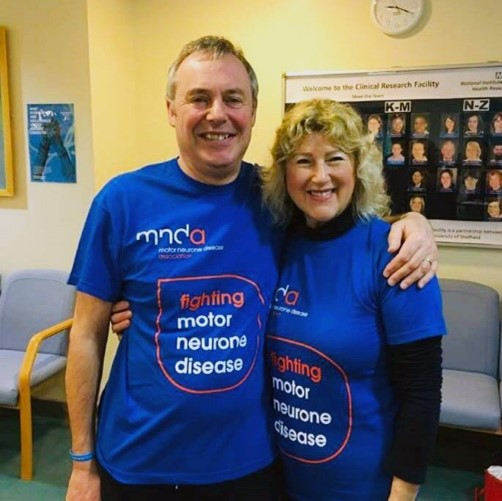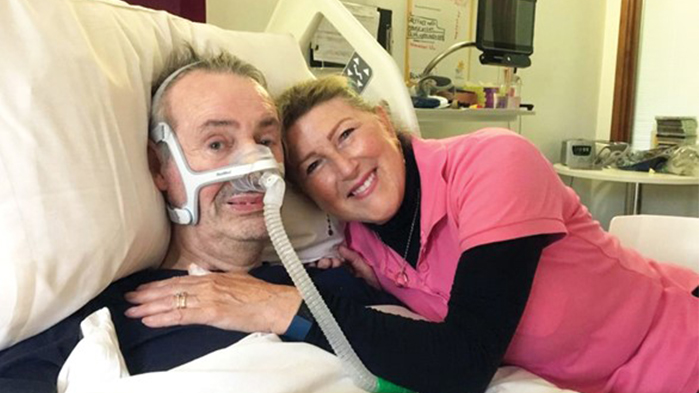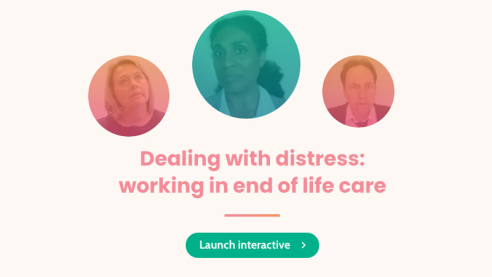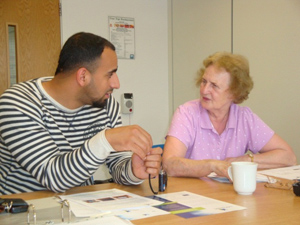Find out about The Open University's Health and Social Care courses and qualifications.
‘Life’s good – it’s the disease that’s the problem.’ These are the words my husband said a lot when he was battling MND. We also used to frequently say ‘Where there’s a will, there’s a way’. Indeed, during his illness we did everything we could to keep his spirits up after being told he had six months to two years to live.
‘Make life beautiful and keep hope alive’ would be my abiding message to anyone caring for a loved one with a terminal condition. It’s not always easy, but what’s the alternative?
World turned upside down
 My life was beautiful. I was happily married to Alan (pictured together, right). We both had good jobs and our social life was busy and joyful. Then, on 21 November 2017, the bombshell landed.
My life was beautiful. I was happily married to Alan (pictured together, right). We both had good jobs and our social life was busy and joyful. Then, on 21 November 2017, the bombshell landed.
I will never forget that day. After experiencing some trouble with his right arm, Alan went to his doctor, then had a raft of tests with a neurologist. When we were told he had Amyotrophic lateral sclerosis (ALS), a form of MND, it was unbelievable. Isn’t that what Professor Stephen Hawking and those rugby players have or had?
When Alan contracted pneumonia and was rushed into Coventry hospital, I thought that was the end. But after a few weeks’ worth of strong antibiotics and robust physiotherapy, he pulled through.Devastated but not defeated, we set about living every moment with as much joy as possible. We dug deep and found strength. Don’t get me wrong, it was very tough, and I often cried through the night once Alan was asleep. But we adopted a positive mindset and that helped us enormously. It was hard being both Alan’s wife and his carer but, in some ways, it brought us even closer together as we made special memories that have sustained me since.
‘Get as much physical and psychological help as you can’ would be another piece of advice. We did. I gathered up friends and family to support me with caring duties. Many found it a privilege to be asked and Alan enjoyed having the company of those he loved. Both of us had counselling because we went into anticipatory grief. I had never heard of the phrase. Apparently it’s common but no one ever talks about it. It’s when you know the loss or change is coming and you begin grieving it before it actually happens.
Rushed to hospital
When Alan contracted pneumonia and was rushed into Coventry hospital, I thought that was the end. But after a few weeks’ worth of strong antibiotics and robust physiotherapy, he pulled through. He then spent six weeks at Myton Hospice for symptom control before coming home. The hospice was amazing. I have nothing but praise for everyone there. Uniquely the staff helped Alan dictate his life story which he proudly gave me on a CD when he came home.

When Alan died in the summer of 2019, I was shocked and devastated, even though I knew it was coming. Several years on and I am beginning to feel positive about life again. I am a volunteer at a local hospice and for MND Association – raising awareness and lobbying MPs and councillors. Using the biography Alan dictated, and my own notes from his illness, I have written a book about our experience as a way of helping others who care for a loved-one who is seriously ill.
While Hazel and Alan’s story is unique to them, there is much that others can learn from their desire to embrace life in the face of death. And as Hazel notes, getting emotional and practical support can be beneficial for unpaid/informal carers to help maintain their own wellbeing and resilience while also supporting the person who is terminally ill. By sharing their story, Hazel offers up a candid reflection on the mental health journey carers can experience in the context of terminal illness.










Rate and Review
Rate this article
Review this article
Log into OpenLearn to leave reviews and join in the conversation.
Article reviews